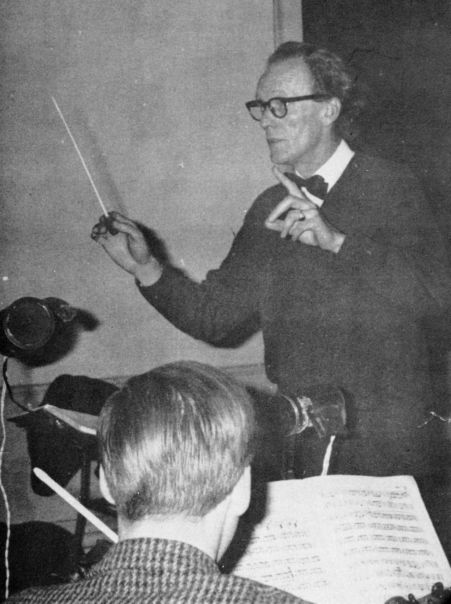

It is sad to have to record the death in the Autumn Term of Mr. Barry McBeath, who had been Director of Music at the College from 1971 till his retirement in the summer of 1983. He was still part of the College community, of course, living in Peel Hall in term time, though he had been rarely seen since the previous summer when he had had a spell in hospital.
With his rich Scottish highland tones, his tweeds, and even on occasions his kilt, he was for many the personification of the traditional north-of-the-border gentleman. His unfailing charm, courtesy and good humour could put everyone at ease, from the timid new first-year pupil, keen to learn an instrument, to the anxious fifth-year House Music Captain, from the husky sixth-form boys, who thought singing in an opera chorus was an extension of raucous rugby songs, to the visiting piano teacher, who needed convincing that a day spent in a cold nissen hut with beginners at the piano was a real inspiration. He could even sparkle at breakfast — Mrs. McBeath once told me of how he glanced quizzically at a senior girl who talked non-stop throughout and asked her who wound her up in the mornings!
In his address at Mr. McBeath's funeral service, the former Vicar of Wymondham, the Rev. George Hall, spoke warmly of his life first as a musical prodigy, then of his time in the services during the last war. He had after the war been Director of Music at Reading School for many years before first coming to the notice of Wymondham College by marrying and taking away to Reading a Miss Mair, who was later to return with him to Norfolk, as we all know. It is characteristic of Mr. McBeath that he had rarely spoken of his distinguished past — his modesty was one of his innumerable endearing qualities. Just occasionally, though, the prodigious talents would burst out when he would launch into an improvisation on the Chapel organ when a preacher had kept us waiting, or into theme and variations on the Teddy Bears' Picnic when an opera rehearsal was held up through some problem of the acting or the movements.
The term "affection" is often used as an exaggeration, but not in his case. It is with real affection that many of us will remember him. He always had a cheery word, would go to great pains to encourage the fainthearts, was patient and kind and understanding with everyone. Perhaps, though, the vast majority will remember him best for his incomparable handling of the Mair Cup evening, which is in many ways the biggest social event of the year. He had to make sure everything ran smoothly, that even the least skilled were given a fair chance, and that nobody came away unhappy whatever the outcome. So many varieties of musical taste had to be reconciled, so many changes of format had to be incorporated over the years. His comments from the platform were masterly. It would have been so easy to "steal the show", to patronise those who were popular, to pour scorn on the less successful, but never for one moment did he forget that it was their show.
When he retired five years ago, two unusual tributes were paid to him, which indicate the affection in which he was held. One was a poem by Mr. Matthews, published in this magazine with one of Mr. Chedgey's clever pen-and-ink sketches; the other was an "almost" impromptu rendering of some of his favourite George Gershwin numbers by the senior choir at his final concert. We know they both gave him much pleasure, but this could be nothing compared with the pleasure it was for us to have known him.
R.J.G. (Roger Garrard)
Contents
![]() The Gallery
The Gallery
![]() Members of Staff
Members of Staff
![]() Barry McBeath
Barry McBeath